How to choose an air humidifier for an apartment: which humidifier is better and why
Dry air in the apartment negatively affects the health of household members, especially allergy sufferers and small children.A humidifier will help normalize the microclimate. The main thing is not to get confused in the variety of models and choose a suitable unit that meets the operating conditions.
To understand which air humidifier is better, you need to compare the parameters of different devices, evaluate their capabilities and effectiveness.
In this material we will talk about how to choose the device that best suits your specific requirements. In addition, in the article you will find a brief overview of the most popular models among buyers.
The content of the article:
Is a humidifier a fashion statement or a necessity?
Air humidity is one of the determining criteria for the microclimate of a room. For an apartment, the optimal figure is 45-60%; in a house where there are small children, the standard rises to 70%.
In early autumn and spring, a comfortable moisture level is established naturally - due to active air exchange. In summer and winter the situation becomes more complicated - in hot weather and during the heating season the air becomes dry.
Keeping the windows open in winter will cool the room.At the same time, within 15-30 minutes after closing the window, the relative air humidity will decrease due to the active operation of heating devices.
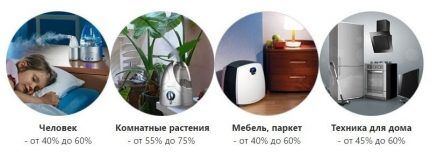
The best way to normalize the microclimate in a “dry” apartment is to use a humidifier.
Alternative methods (placing aquariums and fountains in rooms, hanging wet towels on radiators, etc.) are ineffective and give short-term results.
Variety of models and operating principle
Before choosing a suitable air humidifier for your apartment, you need to understand the technical capabilities and operational features of various units.
Traditional – cold evaporation humidifiers
The models are distinguished by their simple design; the work of classic representatives is based on natural evaporation of moisture.
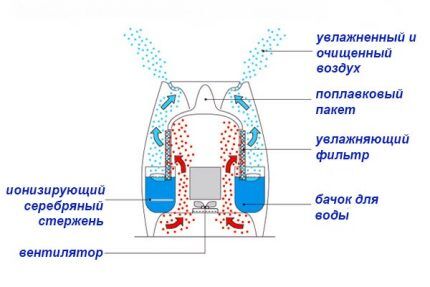
The fan pumps air masses, directing the flow to the filtration wet element. When saturated with moisture, the air flows back into the room. The porous filter is constantly in contact with water. However, if you do not “fill” the tank in time, the device will not turn off and will continue to operate in ventilation mode.
The performance of a traditional humidifier depends on humidity in the apartment. The higher the moisture level, the slower evaporation occurs. Thanks to this, the degree of hydration is normalized naturally.
Service Features:
- regular fluid replenishment;
- cleaning the filter twice a month - just rinse the sponge under the tap;
An important condition for the long-term operation of a “cold” humidifier is refilling with distilled, demineralized water.
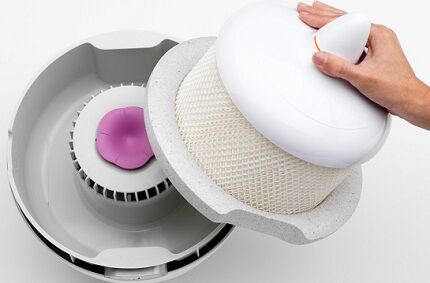
Advantages of traditional models:
- affordable price;
- low power consumption (20-60 W);
- suitable for aromatherapy;
- safety – no hot steam.
Among the disadvantages, consumers include operating noise (35-40 dB) and limited humidification (up to 60%).
Traditional installations are suitable for children's rooms, but for conservatories their performance is not enough.
Steam – high performance devices
Steam devices operate on the principle of evaporation. Their design and operation process resemble a household electric kettle.
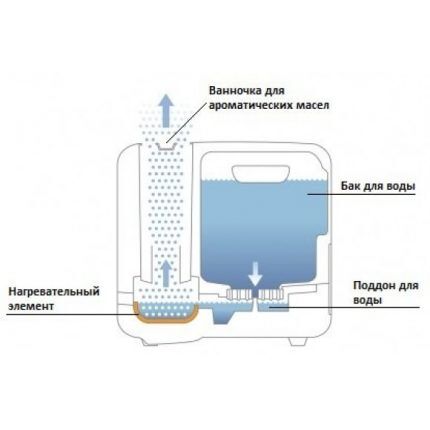
Water is dosed to the heating element, converted into steam and released into the atmosphere. Hot evaporation allows you to increase the humidity in a spacious room in a matter of minutes.
However, in the absence of a hygrostat, this advantage becomes questionable - uncontrolled operation of the device is fraught with the appearance of dampness in the room.
The advantages of a steam humidifier for the home include:
- high performance;
- work on water of different quality;
- quickly achieving a humidity level of 60% or more.
The steam humidifier is easy to maintain - there are no filters to clean or replace. The only thing that is required is to periodically remove scale from the heating element.
Disadvantages of a “hot” steam unit:
- energy consumption – 300-600 W;
- the need to separately purchase a hygrostat to maintain optimal humidity;
- risk of getting burned by hot fumes – the temperature of the air cloud at the outlet is about +55 °C;
- noise when water boils.
Due to the risk of burns, it is not recommended to install the device in children's rooms. It is advisable to use a steam apparatus in a flower shop, greenhouse or winter garden.
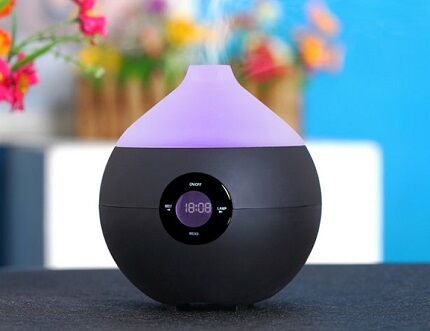
Ultrasonic – economical and efficient installations
The use of ultrasonic vibration in the development of the humidifier made it possible to achieve an optimal balance between efficiency and energy consumption.
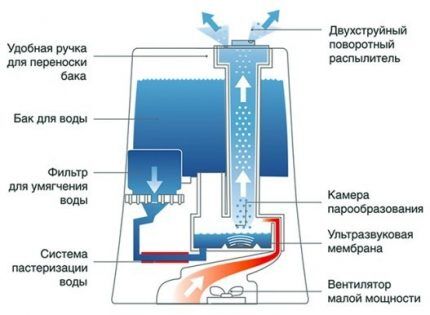
An idea of the design of a humidifier will help you understand how the device works:
- Water is poured into the tank and filtered.
- The liquid flows onto an ultrasonic membrane or disk.
- When alternating current is applied, the plate oscillates at a frequency of more than 20 kHz.
- Under the influence of vibrations, water molecules break away from the surface - a cold stream of steam is formed.
- The fan blows the water mist out through the rotating nozzle.
The most advanced modifications are equipped with a hygrometer that constantly reads the moisture level. Depending on the user-specified parameters and environmental conditions, the frequency of the ultrasonic wave changes.
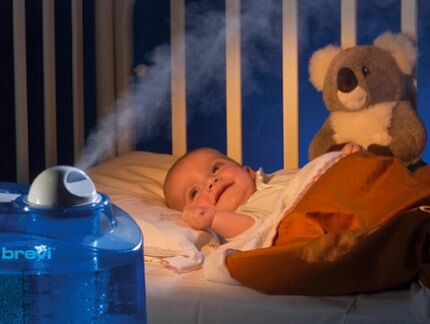
Advantages of ultrasonic sprayers:
- quiet operation of the device - on average about 25 dB;
- ability to set the humidification mode;
- safe operation - not hot steam is supplied outside;
- ergonomic and compact body.
Disadvantages of an ultrasonic installation: higher cost and the need to periodically change cartridges (once a quarter). Models of humidifiers without “softening” filters require refilling with purified water. Otherwise, salt deposits will appear on the floor, furniture and plants.
Humidifiers ultrasonic type suitable for premises for various purposes: residential buildings, apartments, offices, antique stores, greenhouses, etc.
Air washing – humidification and cleaning
Unlike the household appliances discussed above, “washes” perform a dual function - they clean the air masses and at the same time moisten them.
The design of the universal unit is simple:
- water tank;
- fan;
- drum with working plates.
The device does not have replaceable filters. They are replaced by a complex of polymer disks with an adsorbent coating.
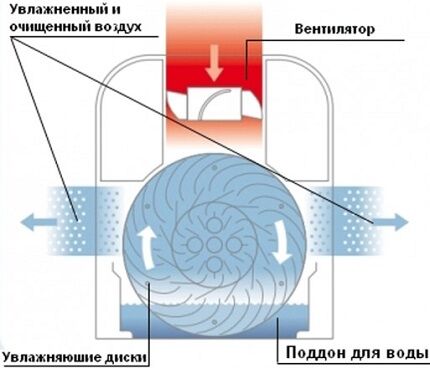
Contaminant particles are washed into the tray and disinfected under the action of silver ions. A “water bath” with ionization suppresses about 600 types of bacteria, fights allergens and eliminates odors. Some air washers are equipped with fragrances.
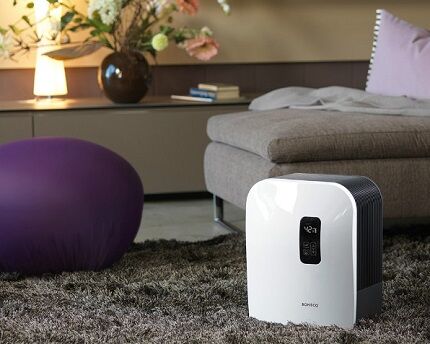
Operational features:
- electricity consumption – 120-400 W;
- low noise level;
- slow saturation with moisture;
- purification of air masses from impurities larger than 10 microns;
- does not provoke the appearance of limescale on objects;
- safety of use;
- Easy to maintain - you need to wash the water tank weekly.
Compared to previous humidifiers, sinks are more expensive. You can read more about air washers in this material.
The purification plant will bring more benefits to people with respiratory diseases and allergy sufferers. Read about which type of air purifier is best for allergy sufferers Further.
Combined units – multi-tasking systems
Household climate control units provide an integrated approach to improving the microclimate of an apartment:
- purify the air using a multi-stage filtration system;
- refresh the atmosphere by removing unpleasant odors;
- humidify the treated air.
Air conditioners are equipped with sensors that respond to dryness, dust level, smoke and other parameters. Automation works to maintain air hygiene and normalize moisture levels.
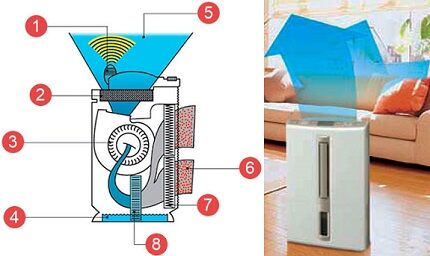
The quality of climate control systems is not satisfactory. Despite the bulkiness of the unit, the complex is low noise and economical in energy consumption (up to 20 W).
The disadvantages of air conditioners include high cost and significant maintenance costs. Filters need to be changed every 3-12 months.
Criteria for choosing a home humidifier
Having decided on the optimal humidification technology, the most significant parameters of the device are selected.
Conventionally, the decision-making algorithm is based on the following selection criteria:
- the power of the device in accordance with the area of the room;
- tank volume, which determines the period of continuous operation;
- noise level;
- installation method and design;
- management method;
- additional functionality;
- value for money.
Humidifier performance. The parameter is indicated in milliliters or grams of water evaporated per hour. A more productive device can serve a larger area of the house.
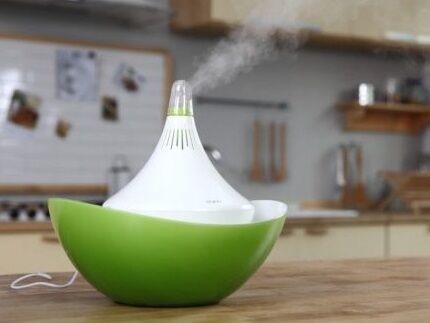
However, with similar efficiency, the power consumption of humidifiers differs significantly:
- 40-50 W – ultrasonic models;
- 300-600 W – hot steam units.
The choice of performance should be based on the dimensions of the room. In this case, the area of a specific room is taken into account. It is a mistake to think that if you buy a highly efficient device for 60-100 sq.m, it will efficiently humidify the entire apartment. This is not true - air circulation between rooms is difficult.
To maintain an optimal microclimate throughout the house, it is better to install several humidifiers designed to serve a certain area.
Tank volume. The value determines how often the water in the tank will have to be renewed. Often, high-power humidifiers are equipped with a larger capacity.
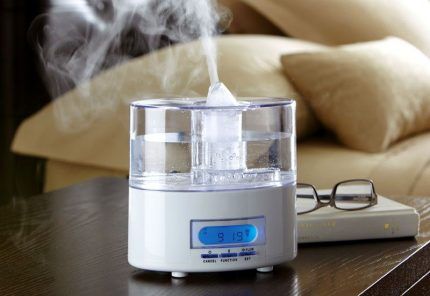
Not all manufacturers indicate the continuous operation time of the unit. The value can be calculated independently by dividing the volume of the tank by the fluid flow per hour. For example, the capacity of the tank is 4000 ml, consumption per hour is 400 ml. Therefore, within 10 hours the humidifier will use up all the water.
Noise exposure level. This indicator should not be neglected. A barely perceptible noise during the day is heard more clearly at night. This is especially important when choosing a humidifier for the nursery and bedroom.
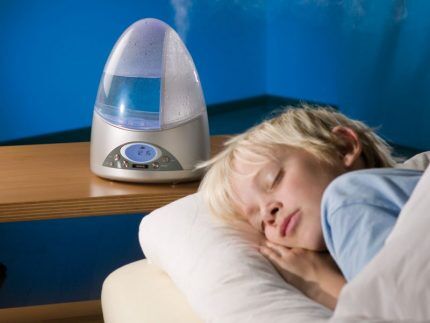
A humidifier with an indicator of up to 20 dB is suitable for the bedroom and children's room. You can put a device with a parameter of no more than 35 dB in the living room.
Installation method. All household humidifiers are divided into floor and tabletop.The first ones, as a rule, include “washing stations” and climate control systems. The units are bulky and not convenient for use in compact apartments.
Tabletop humidifiers are mobile - they can be placed on a bedside table, closet shelf or windowsill.
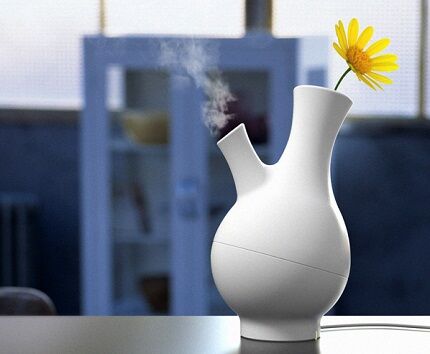
Adjustment method. The choice is between mechanical and electronic control. Mechanical units are cheaper, but have limited functionality - there is a knob for adjusting the operating mode and operating time on the body.
Humidifiers with electronic control are equipped with various indicators showing water level, humidity, temperature, current operating mode, etc. Expensive devices operate in “automatic flight”, adjusting operating parameters to the conditions of the apartment.
Advanced functionality. Among the significant options is the presence of a hygrostat. The element controls the moisture level and prevents dampness in the room.
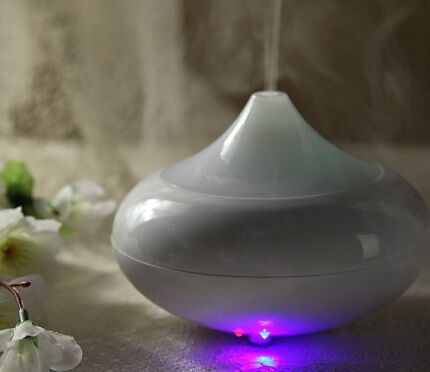
Balance of quality and price. In this matter, an important role is assigned to the manufacturer.
A wide range of humidifiers of decent quality in price categories from economy to premium are represented by the following brands:
- Sharp (Japan);
- Boneco Air-O-Swiss (Switzerland);
- Philips (Netherlands);
- Polaris (England);
- Electrolux (Sweden);
- Shivaki (Japan);
- Winia (Korea);
- Fanline (Russia).
The production of budget models of good quality is established by the following companies: Vitek, Scarlett and Supra.
Review of the most popular models
Below are the most popular humidifiers used in everyday life. The demand for models is due to their reliability, ease of use, operating efficiency and price-quality ratio.
Boneco E2441A – traditional way of humidification
The device has been awarded the Red Dot industrial design award. The original shape, along with economy and efficiency, keep the model among the bestsellers. The operating principle is based on self-regulating evaporation.
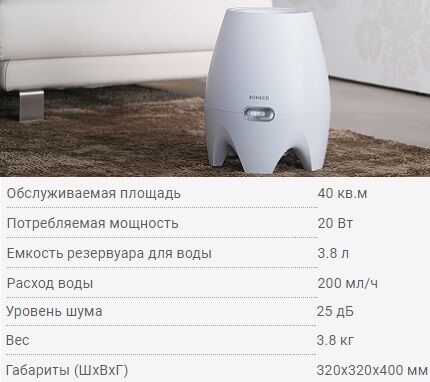
Distinctive features of Boneco E2441A:
- antibacterial humidification filter;
- silver ionizing rod ISS;
- operating mode indicator;
- power selection – 2 levels (normal and night);
- Estimated cost: 120-180 US dollars.
To maintain quality, you need to change the filter once a quarter and clean the water tank every week.
Ballu UHB-400 – ultrasonic steam atomization
Despite its compact dimensions, the humidifier copes with its task efficiently and quickly. The appearance resembles a night light, the model is available in three colors.
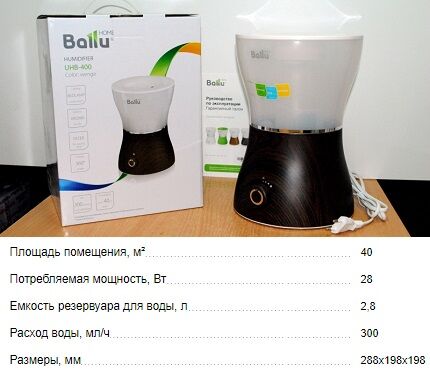
The device is equipped with an ion exchange filter for primary water purification. The cartridge is designed for 150 liters. If the humidifier operates daily for 8 hours or more, the filter must be replaced every 45 days.
Ballu costs around $40-$50.
Boneco U7135 – premium representative
Ultrasonic device with convenient electronic control.The model is equipped with a hydrostat that automatically regulates the moisture level in the apartment.
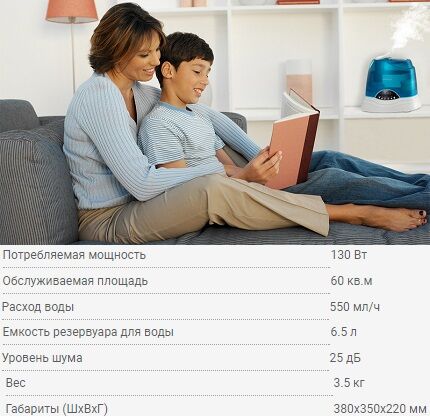
Distinctive features of Boneco U7135:
- control of humidification intensity;
- cleaning indicator;
- filter with silver particles;
- shutdown due to lack of water;
- water disinfection system – preheating to 80 °C.
The disadvantage of Boneco U7135 is its high cost (about $150).
Fanline VE-200 is a Russian-assembled device
A multitasking unit designed to serve small spaces – 20 sq.m.
The air washer performs three cleaning stages:
- mesh filter – carries out coarse filtration, trapping wool, hair and dust;
- plasma cartridge – removes plant pollen and some harmful microorganisms;
- drum with wetted discs – further purifies and humidifies the air.
The mechanical control panel has on/off buttons, ionization, enhanced filtration, backlighting, ozonization and a toggle switch for adjusting performance.
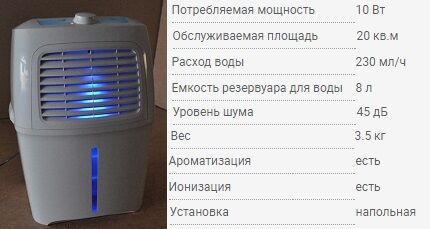
Conclusions and useful video on the topic
Practical recommendations for choosing a household device to increase humidity:
Testing different humidifiers at home:
We can summarize that an ultrasonic humidifier is better suited for an apartment. When purchasing, it is important to compare the performance of the device with the area of the room. An important argument in favor of this or that model is the absence of noise and ease of maintenance.
Still can't choose the right humidifier? Or still have questions about the topic of this article? Ask them in the comment block and we’ll figure it out together. Or maybe you've already purchased a humidifier. Please tell us which model you chose, are you satisfied with its performance?

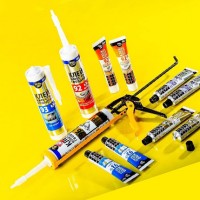
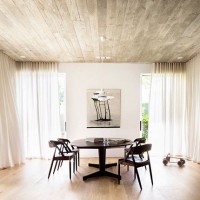
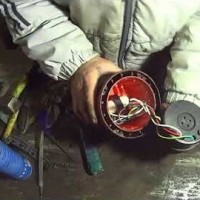
And I think that this is more a tribute to fashion than a real necessity. At least in summer we have high humidity. So high that we turn on the dehumidifier, and in winter it drops to a level of just 45-50%. I have a small child, and in order to maintain the level of moisture in the room, I did not specifically purchase a humidifier, but simply washed the laundry and it dries naturally, thereby the evaporation not only restores the required level of humidity in the room, but also spreads a pleasant smell from fresh laundry. Or I hang a wet towel on the radiator. Perhaps I'm old-fashioned and wrong, but I don't see the need for a humidifier yet.
Increasing the comfort of life cannot only be a tribute to fashion, but a humidifier increases comfort and has a beneficial effect on health. The main thing is to choose a good one. For example, we bought the domestic Atmos, a quite decent humidifier and inexpensive. It moisturizes normally, has a backlight, and works silently. Among the shortcomings: perhaps the lack of a timer and a short cord.
It is better to dry your laundry in a dryer or on the balcony, especially if you have a small child. I don't think it will be beneficial for him to breathe in the fumes of the powder. But a humidifier will come in handy. You are lucky, of course, that the humidity level is good. It was uncomfortable for us to live without a humidifier.We have already changed 3 models and the most successful was the last one - Stadler Form Fred F‐005EH. It's been serving us for almost a year now. I didn’t look at the prices now, but we bought them for 6,800 rubles on Avito. Paid upon receipt at boxberry. I went to pick it up with my husband. He looked at the technical part and assembly, and I, you know, assessed the design and convenience) I want to say that the humidifier is excellent for such a price. It works silently, is of high quality, there were no problems with it. The design is cool, really high-tech))
We bought a regular steam generator humidifier for our home. In principle, that's enough. Ionization and cleaning - these functions are included in the air conditioner. The main thing is to take clean water. And, in theory, it can be used as an inhaler, but I haven’t tried it yet. It’s not expensive, we actually bought it on Avito for some ridiculous price, but on Boxbury we paid only after we examined it.
Good material to understand the topic. How often do you need to clean filters and other parts? Do I need to add special water? What about the noise from the purifier?
Nowadays, the most common models of air humidifiers are ultrasonic. They are very picky about the quality of water, and people also need to approach this issue responsibly. After all, you will inhale the steam that is formed from the water in the humidifier. It is best to use distilled water - this is the best option.
As for the frequency of filter replacement, it will be enough to change them once every three months, that is, four filters will be enough for you for a year.
To avoid cleaning the device every two months, I recommend using a special hygiene additive.There is a good manufacturer Venta, they also make humidifiers.
Regarding noise, there is practically none; 25 dB is the noise level from ultrasonic humidifiers. For an analogy, this is a whispered conversation between two people at a distance of several meters.